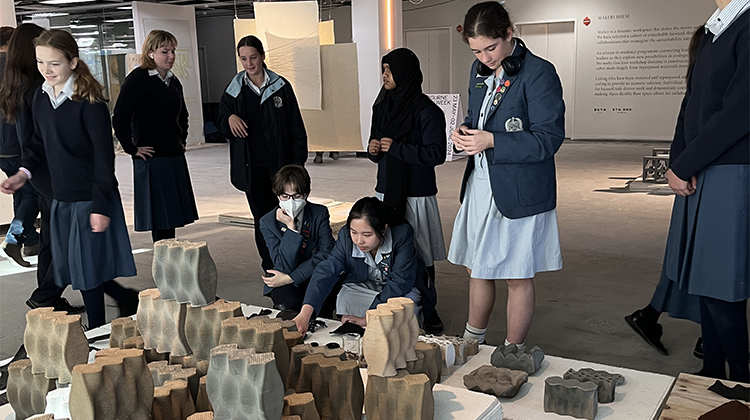Brewing Innovation

Victoria drinks a lot of coffee and the consequence is a lot of used coffee grounds, it’s actually useful stuff and multidisciplinary design studio Nexus Designs and students at Sacred Heart College in Geelong have made innovative biomaterials from it.
A group of 25 students from Sacred Heart College's Design Futures Lab took part in a series of workshops with the team of designers at Nexus Designs.
Over 80 tonnes of coffee grounds is thrown away each year, so the team have been harnessing circular economy and design principles to conceptualise, prototype and refine new biomaterials that can be used across the design and construction industries.
Danielle Storm, Industrial Designer and Founder of the Design Futures Lab, said, "Showcasing the power of combining professional expertise with youthful creativity, this collaboration has been an incredible experience for the students. It's shown them that they don't need years of study to have a significant impact and drive forward meaningful change.”
Over the course of the project over 300 material samples have been created, with technologies employed to test the capabilities and potential applications of these new materials, including 3D printing, laser cutting, kiln drying, moulding as well as extensive binding agent exploration. The project has seen the team overcome several challenges including developing strategies to prevent mold growth in the materials, which has included research into historical food preservation techniques.
After extensive experimentation and testing, the final biomaterial comprises up to 98% spent coffee grounds, and is bound with clay and water. Harnessing parametric design software which uses algorithms to create complex, customised structures, the students created the ‘coffee ground block’, manufactured using a 3D printer. With the block form selected for its adaptability to different applications - ranging from walls to table bases - it has the potential to be reconfigured and applied across the design and construction industries.
As design and colour consultants to some of Australia’s leading building product manufacturers including Haymes Paint, PGH Bricks and COLORBOND® steel, Nexus Designs is at the forefront of material innovation and application in the construction and interior design sectors.
Nexus Designs Co-Director, Sally Evans commented, "Whilst initially placing expectations on how we wanted the material to perform, this process was a great reminder of what can be achieved when you let the innate qualities of a material inform a product’s function. The student’s capacity for uninhibited creative exploration has been inspiring. Going forward we will continue to encourage our clients to embrace a more curious design approach, which we anticipate will unlock design ideas we couldn’t have imagined at the outset of projects.”
Sharmina, Design Futures Lab student and Designer noted that their practice is rooted in a growth mindset, saying “Embracing experimentation has allowed chemistry to guide us. Celebrating imperfections and unafraid to make mistakes we have expanded ours and Nexus Designs’ understanding of what’s possible.”
The collaboration has inspired the students' career aspirations and Danielle Storm notes that having gained real-world experience and mentorship through the project, many of the students have expressed an interest in pursuing careers in design and architecture.
“This project exemplifies the Design Futures Lab's cross-disciplinary approach, blending biology, technology, activism, and innovation. Working alongside the interior, graphic and product design specialists at Nexus Designs, this project has provided the students with invaluable work experience and the opportunity to develop real-world skills in resilience and collaboration,” commented Storm.
The results of this collaboration were displayed at Material Matters 02, an exhibition that explores the development and application of sustainable materials within the context of retail spaces.